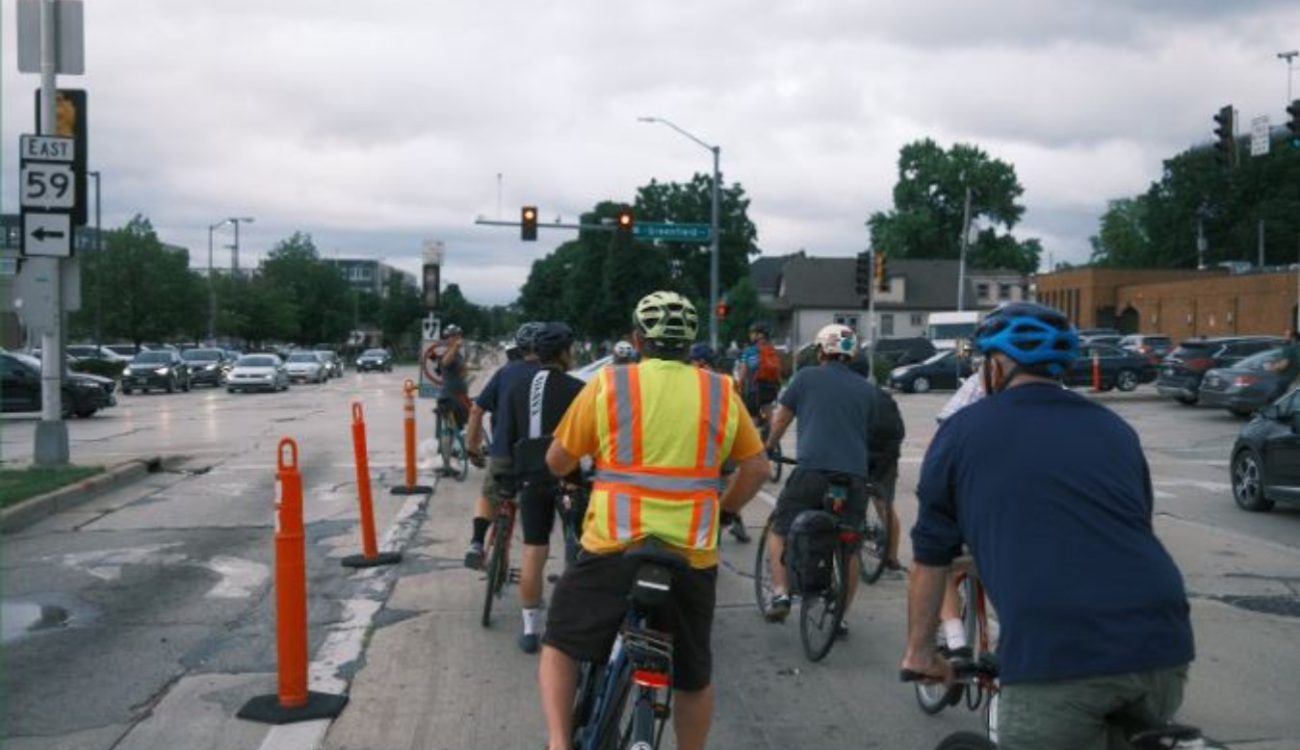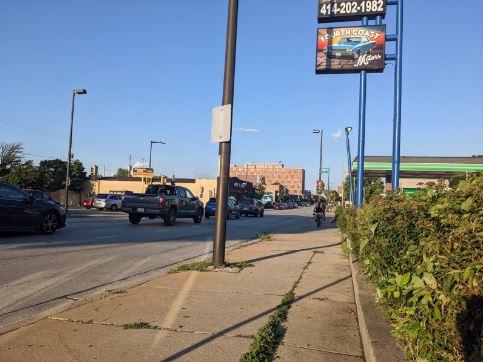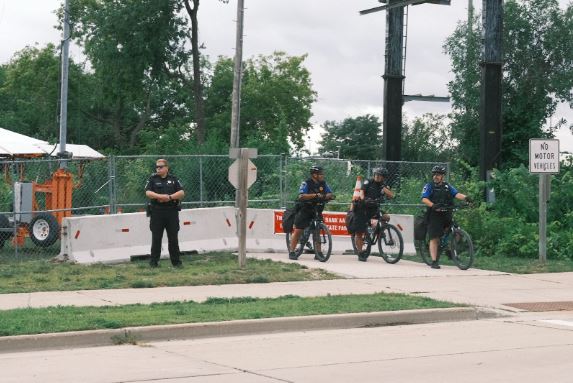
State Fair Forces an Unprecedented Trail Closure, Endangering Users
By Marybeth McGinnis, active transportation advocate from Milwaukee. August 12, 2022.
Feature photo credit: dtloken on Twitter. Cyclists ride the Hank Aaron State Trail detour as a part of a critical mass demonstration on August 8, 2022.
Last week, Milwaukee-area bicyclists received an unpleasant surprise. Wisconsin State Fair organizers had closed The Hank Aaron State Trail (HAST) between 76th and 84th streets.
There was no warning. No safe or clear detour. No communication to the public, our elected officials, or organizations like the Friends of the Hank Aaron State Trail.
The HAST is a critical link in Milwaukee’s already-fragmented biking infrastructure. In fact, it’s the only east-west route that’s separated from car traffic. Hundreds of thousands of out-of-town Wisconsinites travel to Milwaukee’s doorstep to eat food on a stick and enjoy the music, but there seems to be little concern for the people who live and work here every day.
Redefining Safety
Had the State Fair worked with advocates throughout this process, collaborative solutions could have been developed. These options weren’t considered because biking is not seen by policymakers and the police as a mode of transportation deserving of serious, systemic safety efforts. The State Fair (which has its own Board and police force) has updated their website to claim that: “The safety of our Fairgoers is our top priority. The closure of this section of the trail ensures that we are able to secure the entire perimeter of State Fair Park during the 11-Day Wisconsin State Fair.” (Although, as many have pointed out, it would hardly be all that difficult to sneak into the closed trail).
However, safe streets advocates know that safety is not just about the horrific shootings that happen all too often in this country. As pedestrian deaths climb to their highest in decades, we should be clear-eyed: every day on American roads is a mass casualty event. Careless closures risk adding to the death toll.
The trail’s original detour forced users onto roads like Greenfield Avenue, a state highway-acting-as-city-road, which is desperately in need of traffic calming. The most vulnerable road users were thrust onto this dangerous stretch, a place where bus users wait at their stops while breathing in the fumes of speeding cars, where crossing the road on foot with a walk signal is a risky endeavor, where drivers do not take the most care when turning right on red. In response to the outcry over the dangerous original detour, an alternative detour was created, requiring trail users to be off-trail for much longer than the closure itself. Neither the original nor the alternative detour include physical barriers from cars.
The HAST closure demonstrates the weakness in exclusively relying on a handful of off-street trails to serve a major American city. Trails are necessary, especially for recreation, new riders, and children who can ride with confidence in a more relaxed environment. But Wisconsin must also invest in safe infrastructure on many routes. In Milwaukee county thoroughfares like Wisconsin Avenue, Fond Du Lac Avenue, and National Avenue are where a high concentration of crashes occur. Motorists have multiple road options if one road is closed (for example, as I-94 was closed this week due to a shooting); bicyclists deserve the same. However, advocates who push for changes on these roads often run into decision-makers who are unwilling to prioritize safer streets.

Rethinking our Priorities
When advocates furiously tried to understand why the trail was closed, they received muddled responses. State Fair Police claimed that the Department of Homeland Security had mandated the trail be closed. Finally, the State Fair has updated its website: “We apologize for the inconvenience the current closure of the Hank Aaron State Trail presents to the users of the trail. The Wisconsin Department of Natural Resources approved the closure at the request of the State Fair Park Board Chairman.”
Biking and safe streets advocates across Wisconsin regularly beg for basic improvements like protected intersections and safety calming measures at schools. They submit comments to a state DOT that manages many of the most deadly roads in the state. They give up their evenings to attend public meetings for even the smallest of road projects. They are told again and again that our cities are just too poor, or our numbers too few, to bother investing in the basic infrastructure that would protect us from two tons of steel.
Yet without a single public meeting or any advance notice, the DNR and the State Fair dropped cement barriers, erected fencing, and semi-continuously staffed the entrance of the trail with multiple police officers. There they were: the kinds of physical barriers we need to keep us safe, now used to put trail users at greater risk, without even the justification of public involvement.
Biking infrastructure like the HAST is managed and impacted by a complex web of government agencies, local municipalities, and various police departments. A bike ride to the grocery store or a friend’s house should be no more complicated than a driver turning their ignition key. Yet these kinds of detours too often make biking complex, delivering an inconsistent and unsafe experience. We must continue to understand all of the ways our infrastructure is vulnerable to decision-makers across the public and private realms and insist on a seat at the table when they make decisions that impact us. A single demand by a chairman is an unacceptable and non-transparent way to make decisions that will impact thousands.

Preventing Future Closures
The State Fair should — and can — be a celebration of the best of Wisconsin. But the closure of Milwaukee’s key east-west link, purportedly due to vague security concerns, highlights how Milwaukee, and people who get around by biking and rolling, are not priorities for Wisconsin. The state previously held the proud title as the second-best biking state in the nation. This year, Wisconsin has dropped to a relatively-abysmal 29th place. For the State Fair to be a true celebration of Wisconsin, its stakeholders must actively care for the people who live here.
Make Your Voice Heard
Despite the media coverage and complaints received this year, the State Fair has not reopened the trail. Although it’s too late for this year, it’s worth calling 414-266-7000 (press 1) and filing a complaint with the State Fair, the DNR Board, and the State Fair Board. Demand that this closure doesn’t happen again.